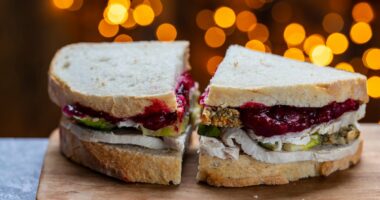Share this @internewscast.com
Data released today paints a grim picture, revealing that over 1,700 patients endured waits of at least 12 hours daily in A&E throughout last month.
NHS statistics disclose that around 54,000 individuals visiting emergency departments in England during October experienced half-day waits before being admitted, transferred, or discharged.
Only 70% of patients were attended to within the four-hour target set by the health service.
The Shrewsbury and Telford NHS Trust had the longest A&E waits, with a mere 54.2% of patients seen within the target time. Hot on their heels were the Royal United Hospitals Bath and Hull University Teaching Hospitals NHS Trust, each managing 55.8% within four hours.
Prominent casualty experts condemned these numbers, declaring the healthcare system to be in a ‘state of national emergency’.
Insiders caution that the situation is likely to deteriorate further as hospitals brace for the onslaught of flu and other seasonal illnesses during the winter months.
Flu cases in England are currently three times higher than normal and NHS England chief executive Sir Jim Mackey has already warned there is ‘no doubt’ this winter will be one of the toughest the health service has ever faced.
It comes as resident doctors — formerly known as junior doctors — are also set to begin a five-day strike on Friday, marking the 13th time since 2022 that the group of medics have taken industrial action.
According to the NHS England monthly A&E performance data released today, emergency departments and ambulance services faced their busiest October yet.
Under three quarters of emergency department attendees (74.1 per cent) were seen within four hours in October, down from 75.1 per cent in September.
The Government and NHS England have set a target of March 2026 for 78 per cent of patients attending A&E to be admitted, discharged or transferred within four hours.
Meanwhile, the 54,314 patients forced to wait more than 12 hours in A&E is up by more than a fifth on the 44,765 who faced this length of wait in September.
Dr Vicky Price, president of the Society for Acute Medicine, said: ‘The latest performance data highlights the strain on the NHS, with patients enduring prolonged waits for assessment and care, beds full and staff exhausted.
‘And this is before we hit the winter months.
‘It is deeply concerning that almost 55,000 people faced delays of over 12 hours in emergency departments last month — 1,752 a day — which is an increase of 9.5 per cent on last year and a 10,000 increase on the previous month.
‘These will be vulnerable people receiving corridor care which was once the exception but is now an accepted norm.
‘It is distressing, dangerous and continues to cause serious and avoidable harm.’
She added: ‘We have warned repeatedly the NHS is in a state of national emergency and that remains the case, yet we are now a month closer to winter with things continuing to worsen — and little to no action on any of the critical problems outlined.
‘The political manoeuvring we are seeing now reflects an awareness that this winter will be catastrophic for the NHS.
‘The reality is that such crises have consequences far beyond politics.
‘Whatever the motivations behind the current positioning, they do nothing to mitigate the dangers ahead for staff and patients alike.’
But separate NHS figures today revealed that the overall waiting list for routine hospital treatment has fallen for the first time in three months.
An estimated 7.39 million procedures like hip replacements and cataracts surgery were waiting to be carried out at the end of September, down on the 7.41 million figure logged at the end of August.
These procedures relate to 6.24 million patients, also down on the 6.25 million patients at the end of August.

Health secretary Wes Streeting hailed the waiting list drop, arguing the NHS was ‘now on the road to recovery’
The list hit a record high in September 2023, with 7.77 million treatments and 6.5 million patients.
A total of 180,329 people were waiting more than a year to start routine hospital treatment at the end of September.
But this was down from 190,549 at the end of August. A year earlier, the figure stood at 249,024.
Despite the pressure on ambulance services, the average response time for emergencies including strokes and heart attacks was also almost ten minutes faster than in October 2024 (32 minutes 37 seconds).
Health Secretary Wes Streeting hailed the waiting list drop, arguing the NHS was ‘now on the road to recovery’.
He said: ‘Thanks to the investment and modernisation this Government has made, waiting lists are falling and patients are being treated sooner.
‘And at the Budget the Chancellor is protecting investment in the NHS, to rebuild after more than a decade of decline.
‘The past year is the first time in 15 years that waiting lists have fallen. There’s a long way to go, but the NHS is now on the road to recovery.’
Cancer patients, however, faced longer waits in September—separate NHS figures released today showed, with none of the three national cancer targets met.
Just 67.9 per cent of newly-diagnosed cancer patients referred for urgent treatment were seen within two months—the target is 85 per cent.
Meanwhile, only 91.2 per cent of patients started treatment within 31 days of being booked in September, below the goal of 96 per cent.
The health service target of telling at least 75 per cent of patients with suspected cancer they do or don’t have the disease, equally, wasn’t met at 73.9 per cent.
Professor Meghana Pandit, NHS national medical director, said: ‘It is fantastic news that the health service managed to get the waiting list down in September.
‘But there’s no doubt NHS staff will be approaching their limits this winter.
‘Flu is peaking early and looking like it will be long lasting, while industrial action starting on Friday comes on the back of the busiest October in A&E in NHS history.
‘Staff continue to work incredibly hard and, as ever, the public can play their part by getting flu, Covid, and respiratory syncytial virus (RSV) jabs if eligible.’
Ahead of the industrial action, patients are advised to attend any planned appointments scheduled during the strikes unless they have been contacted to reschedule.
They should use 111 online as the first port of call for urgent but not life-threatening issues during the strikes so that they can be directed to the best place for their needs.
Patients who need emergency medical care should continue to use 999 or come forward to A&E as normal.















